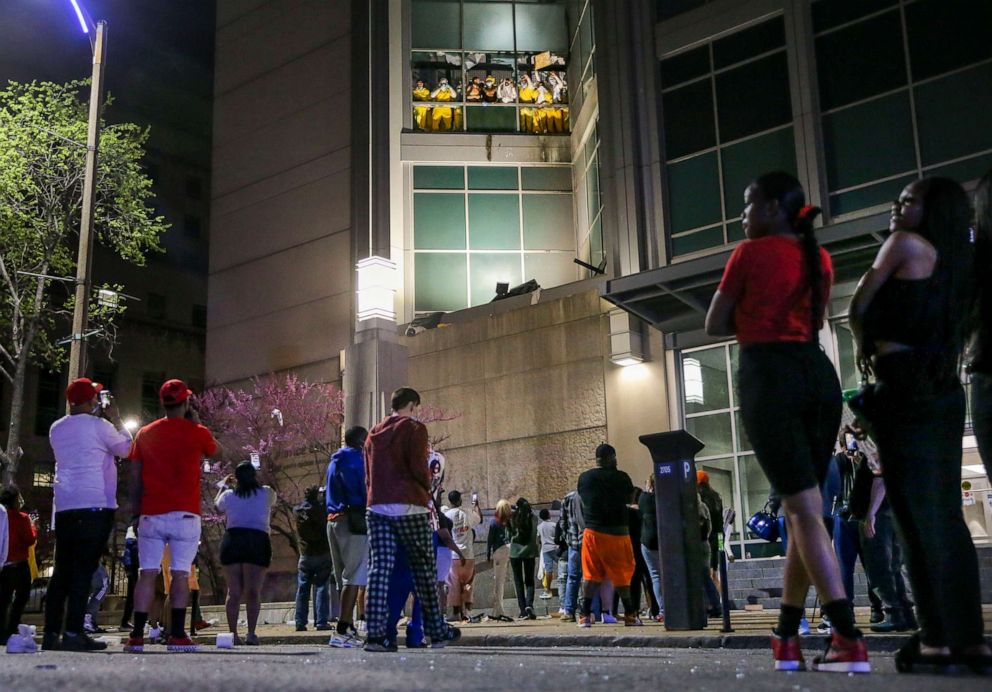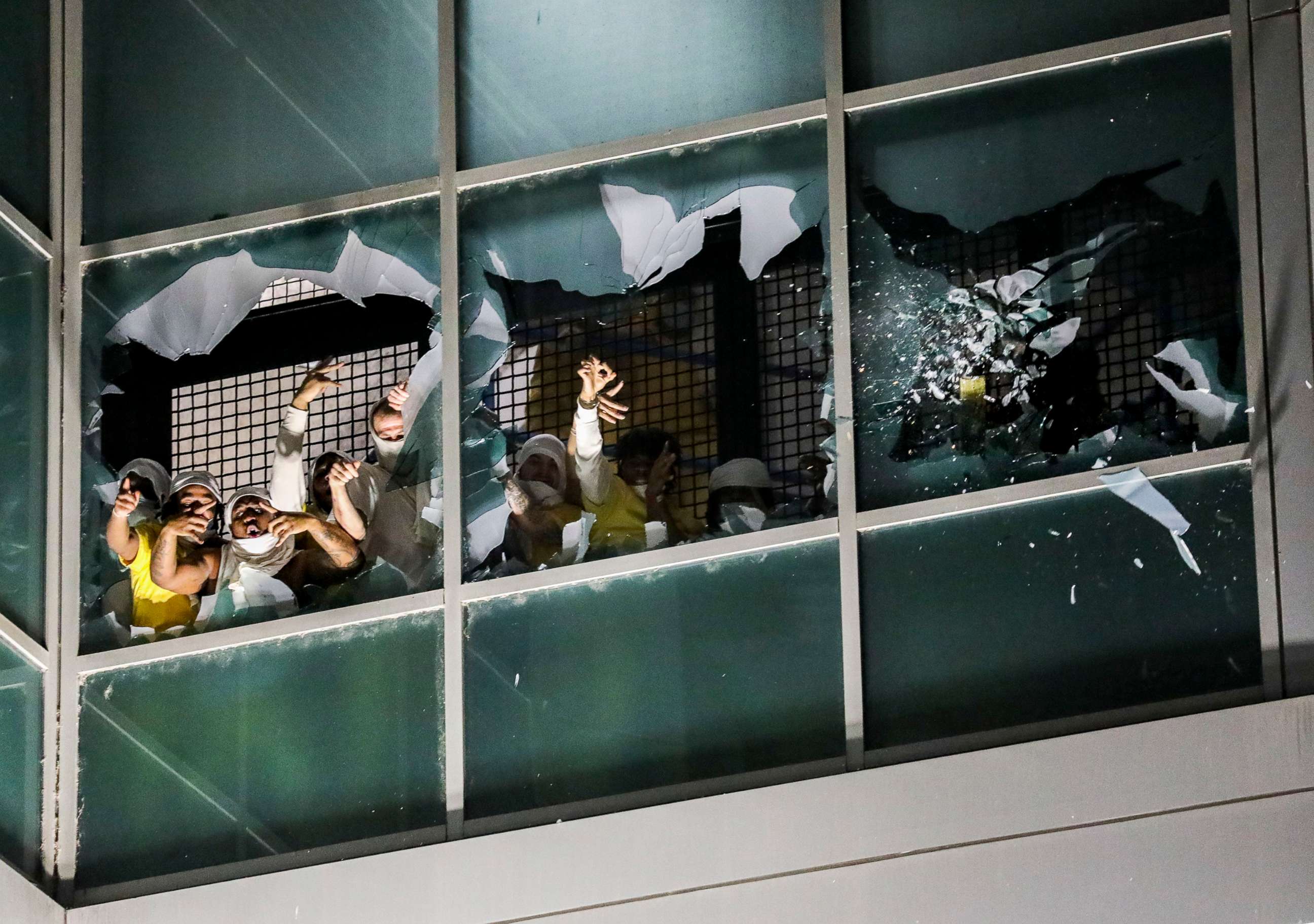St. Louis inmates protest again over long trial wait times, COVID-19 fears
Many pre-trial detainees have waited more than a year for a court date.
About 60 incarcerated people in a Missouri jail escaped from their cells Sunday night in protest of living conditions at the facility. It’s the second protest at the jail this year, and the fourth disruption since December, according to the Associated Press.
Protesters broke the third-floor windows of the St. Louis City Justice Center, lit fires and held up a sign that read: “HELP US” as onlookers watched from below. "We want court dates,” they chanted, signaling frustration over delayed court hearings and conditions within the jail.
Across the country, the coronavirus pandemic has pushed many court hearings and trials back over the past year. This has forced hundreds of thousands of pre-trial inmates into close living quarters, where the risk of COVID-19 transmission is high and where social distancing is nearly impossible, according to a report from the Prison Policy Initiative. St. Louis is no different.
The Justice Center in St. Louis can house up to roughly 900 people, and most of the incarcerated people it currently houses are Black, according to the Center's website. Tracy Stanton of the Freedom Community Center, a St. Louis activist group that works with local inmates, said many of them are pre-trial detainees who have waited more than a year for a trial or court date.
Thom Gross, public information officer for the 22nd Judicial Circuit of Missouri, said the pandemic has hindered the court's effort to move forward with proceedings.
“Since the onset of the pandemic, we operated within the guidelines of the Supreme Court of Missouri, the Centers for Disease Control [and Prevention], and the St. Louis Health Department,” Gross told ABC News. “It’s hard to speculate the course of this disease. We’ll absolutely get back on track as quickly as possible. We went a little over a year without a single jury trial, and we had our first jury trial on March 22.”

During the jail’s February uprising, more than 100 of the people jailed at the downtown Justice Center escaped from their cells during the early hours of the morning. Officials say the cell locking system at the facility is faulty and locks were able to be manipulated by detainees. The protestors also broke windows, set fires and threw items onto the street below.
Rep. Cori Bush (D-Missouri) wrote a letter to St. Louis Mayor Lyda Krewson, Public Safety Director Jimmie Edwards and Corrections Commissioner Dale Glass in February demanding answers.
“Every person in our society deserves to be treated with dignity and respect,” Bush wrote. “We all deserve to have our fundamental rights and civil liberties protected. It is our obligation as public officials to ensure equal justice and protection under the law for every person in our St. Louis community.”
The frustrations among the inmates seemingly haven't changed. Stanton said the people currently incarcerated at the Justice Center are tired of living in fear of COVID-19 and not being brought to trial. In conversations with those incarcerated at the Justice Center, she said she was told they aren’t allowed to have visitors, don’t have access to proper health care and have been waiting longer than normal periods to be tried on their criminal charges.
“I really believe that [the City Justice Center] and the judicial system and the elected officials dropped the ball severely by not creating an alternative to allow people to have court dates,” Stanton told ABC News. “Being under these circumstances -- the amalgamation of all the things that they had to experience -- no recreation, no talking to family members, barely seeing your lawyers, not being fed properly, not having the proper [personal protective equipment] and cleaning supplies. What is to be expected?”

Jacob Long, a spokesperson for Mayor Krewson, called the most recent demonstration “violent” and “dangerous” in a call with ABC News. No serious injuries were reported, but St. Louis City Sheriff Vernon Betts told local news station KMOV that the jail “may have a couple of injured inmates.”
Gross claimed courts have been operating throughout the pandemic, but the biggest hurdle has been the inability to have a jury trial. He said many of the incarcerated people awaiting a court date are being held back by COVID-19 restrictions that make having a jury trial much harder.
“We’ve been summoning potential jurors through the course of this pandemic with the hopes that several weeks from the time of the summons, things would’ve improved so we can have a jury trial, but that hasn’t happened until March 22,” Gross said. But even if they do summon jurors, they can’t predict whether a juror will feel comfortable enough to come into the courthouse during the ongoing pandemic, he said.
Stanton said the first step to addressing concerns from incarcerated demonstrators at the Justice Center is to get court dates and trials back on the docket as the rest of the country begins to relax COVID-19 restrictions.
“Pre-trial detention is just criminalizing the poor,” Stanton said. “These are people being held on pre-trial detention that haven’t been convicted of a crime … at this point, they're being treated as if they're guilty.”




